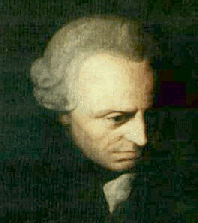











 Human Nature - Philosophically Natural
Human Nature - Philosophically Natural

 Postulates of Morality: FREEDOM, GOD, IMMORTALITY…
Postulates of Morality: FREEDOM, GOD, IMMORTALITY…
Once again, we see in Kant the theory that sensory interpretations cannot be trusted. He believes that the world around us involves projections of human consciousness, which is not necessarily the true projections of reality.
There are two elements in knowledge. The first, being sensation, is passive. Objects project before us are not real, and are only appearances. However it is then through our second element in thought that formulates an understanding of our sensations. Through these two elements, people search for cause of events and try to realize their true essence of reality. Kant, though, understands that we as humans cannot change the exterior influences, but can only change ourselves to become who we want to become.
Moral Choice: the duty to create the highest good.
We are capable of realizing our moral duty. Our power and reality is also dependant upon our beliefs. This ability, unlike thought, is innate; our capabilities to REASON and to discern right from wrong is innate in every person. In this way, the Law of Morals describing human conscience is there, but inexplicably so.
Finally, Kant states that we cannot reasonably prove or disprove God’s existence. This, of course, is then left to faith itself. Included in this statement is the belief that it is necessary to presuppose the facts of people having free, immortal souls and the existence of God.